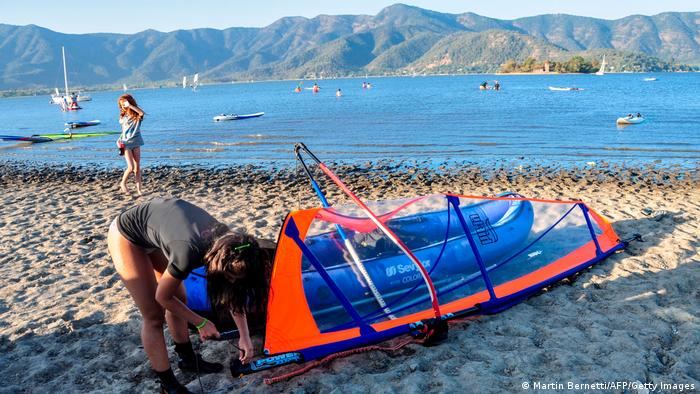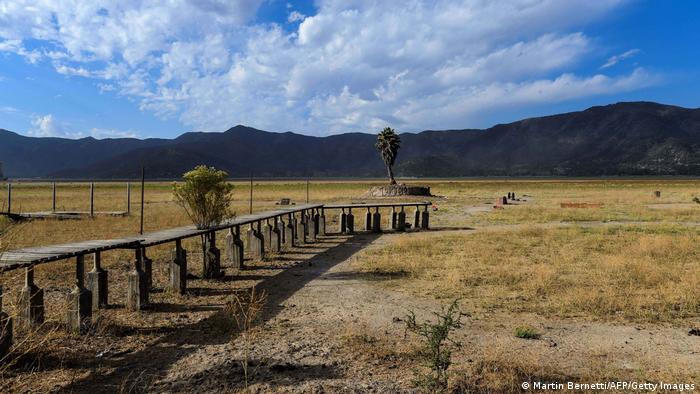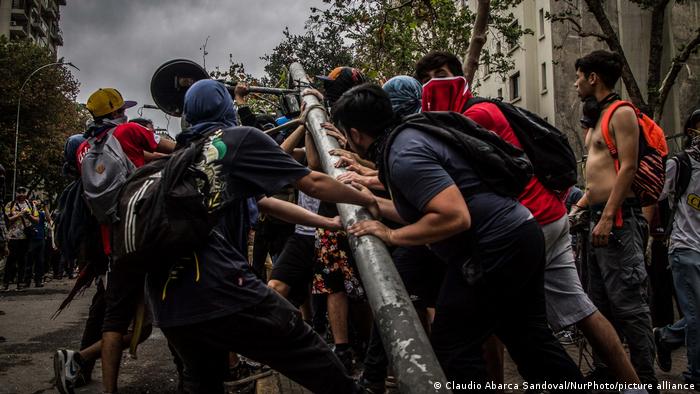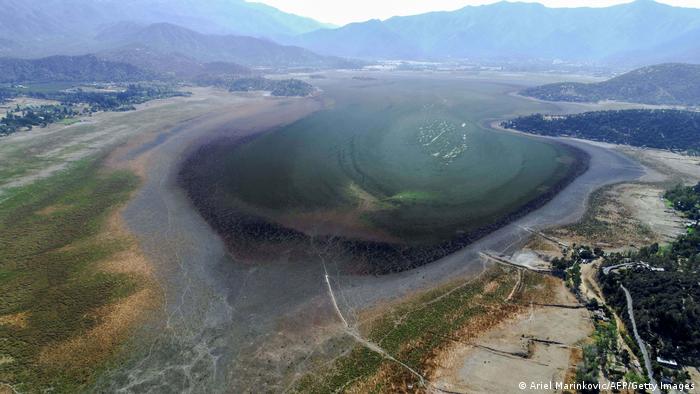According to legend, Laguna de Aculeo, a lake located in central Chile, is home to a wealth of Inca gold. Locals claimed that you could see the gold in the lagoon’s clear waters at night, when it was surrounded by lush hills and overlooked the Andes mountains.
The lagoon, once the largest natural body of water in Chile, is now completely dry and without any signs of life. As it turns out, there was never any gold. However, the true wealth of this water has been discovered by locals.
“I heard birds singing all the time because the fauna and flora in the lagoon were amazing. You could see the fish swim under the water, it was so clear,” said Viola Gonzalez Vera, who has lived by Aculeo, 70 kilometers (43 miles) southwest of the capital, Santiago, for the past 30 years.
The lake bed has become cracked and parched due to frequent droughts. Decaying jetties mark where the water used to be, like ghosts left behind to remind locals of what this place once was.
Chile has been experiencing a megadrought over the past decade. The central regions have received 30% less rainfall than normal. Aculeo’s disappearance was attributed to climate change for many years.
The lagoon had survived for over 3,000 years, despite Chile being no stranger to drought. Hydrology and water management experts confirmed that the picture was complex at the beginning of 2022. Overexploitation by humans was the main culprit.
A disappearing lagoon, and livelihoods
A peer-reviewed study published in the journal Sustainability in January 2022 found that, although below-average rainfall had had an effect over the past decade, there was “indisputable evidence” that water had disappeared because of human activity mainly through diverting rivers and pumping groundwater from aquifers that had replenished the lake
According to the study, the lagoon never dried out even after four droughts and low rainfall over the 20th century.
“But throughout the 1990s agricultural industries started deviating those rivers when the state started assigning 100% of the water rights of one river, and then another, then another,” said Pablo Garcia-Chevesich, a Chilean professor at the Colorado School of Mines and University of Arizona and report co-author.
The Pintue River, an important tributary of the river, was completely diverted in 2010. Large-scale farms that produce cherries and avocados set up deep wells and pumped water directly to the lagoon.
Garcia-Chevesich, a member of UNESCO’s Intergovernmental Hydrological Programme, said that it didn’t matter how heavy the rain was. “The lagoon was unable support a drought for the first time in its history.”
The tourists disappeared along with the natural beauty around the lagoon when it dried up. At the same moment, small-scale farmers near the lagoon watched their harvests shrink while animals died.
Over the years, some in the community had lost access to safe drinking water as new summer homes with pristine lawns and swimming pools guzzled up the supply. But this was nothing compared to the exploitation that occurred when the avocado and cherry producers moved in, say locals.
Gonzalez Vera said that she has seen people cry in the streets because they don’t have enough water to brush their teeth. She relies on a water tank in her backyard, just meters from the lake. The village is supplied with water by truck.
Garcia-Chevesich blams the state for the loss and subsequent impact on locals. “It’s the uncontrolled assignment of water rights without any study and evaluation that includes climate change, social or ecological harm.”
It’s a tale that is told all over the country.
Water as a commodity and not as a human right
Chile’s Constitution, which was created during Augusto Pinochet’s military dictatorship in 1981, protects private water ownership, making it an economically valuable good. The 1981 Water Code gives the government the power to grant permanent and non-transferable water rights to private property owners at no cost.
This created a market for water, making it difficult for Chile’s state to manage its water supply. For example, in Aculeo there were no audits to monitor consumption levels before the state gave rights to water.
“The water problem is very deep in Chile. It’s understood as an additional resource to exploit,” Estefania Gonzalez, campaigns coordinator at environmental NGO Greenpeace Chile.
Over 1 million people in the country do not have safe drinking water. Meanwhile, some parts of Chile are suffering from more severe droughts due to climate change. Individuals and industries have been exploiting water for decades.
Thirsty, extractive industries such as lithium and copper mining drive Chile’s economy. Nearly 80% goes to agriculture, the most famous being the avocado. Each fruit requires 70 liters of water in order to grow.
The situation became so bad in Petorca, a town in Chile’s Valparaiso region surrounded by avocado production, that the government declared a “water emergency,” trucking in water and allocating each resident 50 liters (12 gallons) a day.
But Chileans are challenging this status quo.
A new green vision of the future
Currently, 155 elected representatives from civil society are redrafting Chile’s dictatorship era constitution. This was a key demand of deadly nationwide protests in 2019 against deep social inequality.
It is rare for a country that can create a new vision of the future and one where the environment is given the highest priority. 81 constitutional convention members supported a Greenpeace campaign in support of water rights and ecosystems.
Carolina Vilches Fuenzalida told DW that “we will end stockpiling, hoarding water.” She was a convention member and environmental activist. “We will stop land grabbing, water hoarding, and the building of landscapes of dry Valleys.
Vilches Fuenzalida, along with other delegate, stated that one of their priorities was to create a statute to alter the legal nature water. This would ensure safe access and sanitation for all Chileans. Each bill will be subject to debate over the coming months. A two-thirds majority is required for each bill to be included in the final document.
In March, millennial leftist Gabriel Boric will head up a new government after winning December’s presidential election. Boric, who came to power on a campaign pushing for environmental change, has said he will back the constitutional change.
“The whole nation is waiting for him. If he doesn’t do something, the whole country will be waiting for him. [about the water issues]”We’re talking about enormous social consequences, we might be discussing about a new social boom,” Garcia-Chevesich said, referring to the protests of 2019.
“But it will an estallido ambiental [environmental explosion],” added Garcia-Chevesich.
Edited by Jennifer Collins





